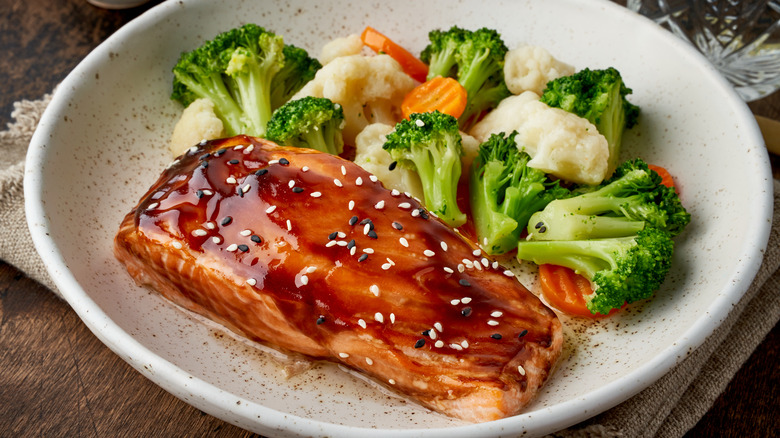Paleo Vs. Keto: Which Is The Healthier Diet For You?
The toxicity of diet culture is pervasive. It's in the rising popularity of calorie-counting apps, the restrictive sizing in brands like Brandy Melville, and in the creativity of fad diets. According to Dr. Paul Loomis, a family medicine physician, "Fad diets are attractive because they seem to promise something we all want: an easy way to lose a lot of weight" (via Mayo Clinic). Dr. Loomis also details a few signs of a fad diet: They can promise rapid weight loss, require elimination of certain foods, and can be very rigid about the rules they create.
Considering the ketogenic (or keto) diet was the most Googled food-related topic in 2020 (via Bolst Global), the diet is clearly trending. The keto diet requires your body to go into ketosis, a state in which your body doesn't have enough carbohydrates to burn and uses fat for energy instead (via WebMd). Therefore, you can expect to consume lots of butter, fatty fish, cheeses, and other ingredients high in protein and fat in this diet. A paleo diet, in contrast, allows you to eat carbs as long as they haven't been created by modern human processes (via Medical News Today). The "paleo" refers to the Paleolithic period of time — dieters are only allowed to eat foods humans could have eaten at that time.
Both fad diets have their benefits and their adherents. Is one healthier than the other?
Long-term commitment is difficult for both
The keto diet eliminates carbs and sugar, replacing them with high-fat and protein ingredients that make your body efficient at burning fat. Its benefits range from effective weight loss to reductions in triglycerides and high blood pressure (via Healthline). The diet can also help reduce symptoms in type 2 diabetes by improving insulin sensitivity. However, staying on this diet in the long run can increase your risk for kidney stones, chronic diseases, and also cause nutritional deficiencies (via Healthline). You could also develop "keto flu," a reaction to ketosis where you experience flue-like the symptoms.
The paleo diet does not give you these symptoms, as the foods on its list don't lead to ketosis (via Medical News Today). Like the keto diet, the paleo diet limits carbs — processed foods, grains, dairy, and legumes aren't on the menu. However, naturally occurring carbs like starchy vegetables are. The whole foods approach can lead to weight loss and improvements in blood pressure. But in the long run, the lack of dairy can leave you with lower levels of calcium and vitamin D, and put you at risk for osteoporosis (via Everyday Health). The diet also doesn't have long-term studies recorded, which means you're going to have to be cautious.
Both diets are similar in the benefits they offer and the way they limit carbs. Research is lacking on long-term usage, as Healthline reports. Speak to a healthcare provider before you take on either of these fad diets.

